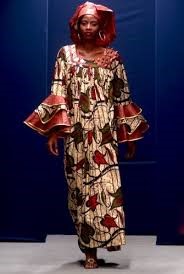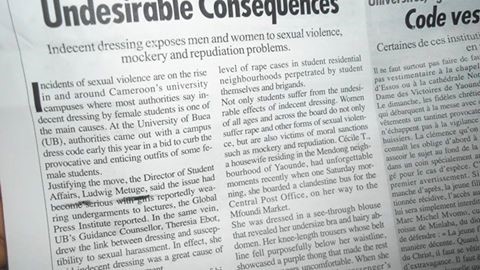Ngwentah Berlyne Ngwalem, Buea, Cameroon, SSH Blog Correspondent

Every article that I have read in newspapers like “Cameroon Tribune” blames women for being “created female’’ as the sole or biggest reason for why they are sexually harassed in the streets by random men who claim to be distracted by their mode of dressing. The message that is sent is that women should remain at home-locked up, in the kitchen cooking because their mere presence in streets is a distraction to men.
My colleagues Zoneziwoh M. Wondieh and Patience Lum and I have been working on addressing harassment. We have found that many men take it as a right to attack women and claim it is because they are indecently dressed and a distraction. But everything in life is a distraction but it is ones decision whether to let it be a point of focus and act on their feelings or thoughts. We pass and meet thousands of people each day. Everything that is different from what you normally see around might cost you to look, admire or desire it but it is not your right to offend or attack based on your fixed ideas, feelings and thoughts on how things should be. These includes people with a lighter and attractive skin complexion, physically attractive looking people, extremely tall or huge people, Dwarfs, Albinos and people of different races.
With these differences if someone were to harass, attack or rape any of these individuals and give the excuse that it is because these people are attractive or distracted them because they look different will the perpetrator’s excuse not be dismissed and they be punished with the reason that those people are who they are not by their making and do not deserve to be harassed because it is the looker’s responsibility to contain themselves? And that the harasser has a mind to think for themselves?.

How is it possible that people consider a woman’s dressing as a possible cause of rape and sexual/street harassment and refuse to see that this whole issue is about power and control given that women in Kabas , Nuns, Children and others who are modestly dressed get raped and harassed?
Another big problem is that police officers are the ones enforcing the dress code. There is no woman/girl I have seen or spoken to who feels safe in the hands of policemen. Girls who get held by policemen for either forgetting their National Identity cards when traveling or sometimes some possible made up reason like mode of dressing or disrespectful behavior towards the police or another individual often complain about those police men married or not chatting them up instead of doing their jobs. It will be worse for you as a woman if you resist their sexual advances.
People ignore the fact that these policemen’s jobs also involve single and married policemen asking for several women’s numbers or making unwanted sexual advances towards them. It involves policemen harassing women under the pretext of implementing the dress code law.
How does it help when such attitudes are not strongly condemned and the policemen not punished, instead women are told they are the cause of their sexual harassment either by forgetting their National Identity Cards or by their mode of dressing? Policemen are being encouraged and taught to know that they are above the law in Cameroon and can violate people’s rights. Men should be taught to take responsibility for their actions. I find the undefined dress code law very confusing and misleading.

Media coverage of dress code in Cameroon encourages people to shame, humiliate and act violently towards women. Women’s problems and difficulties handling harassment in Cameroon does not arise from their dressing, it comes from people’s twisted views about the world and the woman’s place in society. Instead of being taught to be responsible citizens, young people are being taught to continue with the old tradition of policing women’s lives and bodies. They are taught to violate other people’s rights simply because they are of the wrong sex and will eventually be set free because those group of people whose rights are being violated fall under the underprivileged gender with laws constructed for them to follow with the false notion that it is being done for their own good. Patriarchal norms have made it possible for women to get blamed whether or not they do obey, or do not obey and get attacked.
The media and government of this country should change their language and start talking about ways to punish perpetrators of such crimes, not punish the victims, and teach the perpetrators to live in a society full of different types of people, to understand that everyone has equal rights and the law to protect them.
Berlyne is a Cameroonian-based women’s human rights activist, passionate and determined to put an end to social injustice of any kind. You can find her on twitter @Luvequalityrule and Facebook.
